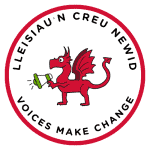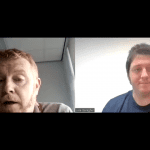Sally Lindsay Interview Transcript
LG: Hi everybody. It’s Luke again for Dementia Action Week and I’m over the moon to say that we’ve got a fabulous guest on this episode. She’s one of those people who doesn’t need introductions because she’s an icon but, for those of you who need a little jog of the memory, she’s worked as part of one of the all-star cast of “Still Open All Hours” as Kath Agnew. When she’s not jetting round showing us posh weekends, she’s also solving mysteries as the new sleuth in town in “The Madame Blanc Mysteries”. I’m delighted to introduce to you, Mrs Sally Lindsay, hello Sally.
SL: Hi Darling, how are you?
LG: I’m absolutely over the moon today, how are you?
SL: Great, yeah, great.
LG: Pleasure to have you here and thank you for your time today. The purpose of this series, we like to say that if you’ve met one person living with dementia, you’ve met one person living with dementia and to prove this with this series, I’m going to ask five people the same three questions just to show how different all the answers are. With that in mind, can you tell us what your involvement and your story is with dementia please?
SL: Well, it’s a long one. When I was, I can’t remember now. I think I was about fourteen, fifteen, my grandmother I was terribly close to, she, so this is a long time ago. I’m forty-nine this year, it was a very early diagnosis for Alzheimer’s disease, one of the first actually and I think that was about the early nineties. She rapidly declined from being this extremely active, very funny, amazing Northern matriarch. I mean, I’ve got all my best lines from my gran, she was ace and very helpful in the community. Worked, she was still working, I think she was about sixty-five when she got it and it was just horrific because then, back in those days, there was no support. There was no help. There was no phone lines, no awareness, nothing. We didn’t know what was going on. She went to a, they called it “Senile Dementia”, such old adages and she went to a little respite thing in the day but they couldn’t handle her because she had different needs and it was quite horrific actually. I think from what happened and seeing how we coped which wasn’t very brilliantly but we did our best. When I got the opportunity to have a high profile which was when I joined “Coronation Street”, I was approached by the Alzheimer’s Society because I talked about her in an interview and that was 2001. So, I’ve been an ambassador for the Alzheimer’s Society since then so it’s twenty-one years now. I’ve always been very active in the progress and the progress from there Luke, to now, it’s unbelievable, you know so we’ve got lots to celebrate. It’s a really positive thing that’s happening, to see change, that’s what’s happened. So, that’s my involvement, it was dedicated to my lovely gran so every time I worked for the Alzheimer’s Society, every time I do an interview, every time I do a walk, every time I do any interview like this, it’s to do with her memory and how much she suffered and how much you don’t need to anymore and that’s my involvement really.
Get news and info from your local council – sign-up for email bulletins.
LG: That’s incredible and out of something so sad, you’ve made it so positive and it is inspiring as well and it’s lovely that we have someone like you to keep the message going. You touched upon it a little bit there which leads me on really nicely to the next question. You said about the lack of awareness when she was first diagnosed. With that in mind, how important, to you, do you feel that events and campaigns like Dementia Action Week and dementia awareness sessions are in the community these days?
SL: Well, I always describe Alzheimer’s and other dementia, other types of dementia, as a tsunami really hitting this country and like almost people realised cancer was in the sixties, seventies, like everybody was getting it. It’s always happened but we’re just all of a sudden becoming aware that our family members may not just be going old and a bit mad. Actually, this is a brain disease. It’s to do with nerve endings, it’s to do with how our brain is set up. It’s not just “oh you get old”, I mean I’ve opened centres for people that are my age and younger that have got early onset dementia. This is not like a, it is mainly an older person’s thing but it’s essentially a problem that one of us, somebody will know one person with dementia nowadays. Like we all know somebody who has cancer, we know someone who’s got dementia and my mission, or the mission of the Alzheimer’s Society and I know other dementia charities is to push that profile up as high as cancer awareness is. Not that either is, obviously cancer awareness is massively important and I’ve sadly had family members pass away with that disease as well but Alzheimer’s especially, we just need to raise, and we are doing, awareness that there is hope out there. There is drugs that can help. There’s also communities that can help. Awareness is you don’t have to be on your own. You can pick a phone up and you can ring someone and you can say “I’m out of my depth here, I don’t know what’s going on” because it’s the most challenging disease to care for when you’re a carer and a family because, essentially, you see someone. I always describe it as though it as their memory being taken away day by day. So, you have to manage that in a way that and raising awareness and saying there’s someone who can help, when somebody can help you sorry. That’s what gets better and better and better and I think that’s happening day by day with stuff like dementia week and the Alzheimer’s walks and all the stuff that we do. In terms of those on television, it’s not just me, there’s a warrior of people that are in the industry who are constantly talking about, you know, Alzheimer’s. It’s a really awareness platform. When the diagnosis comes in, they know they’ve got somewhere to go to.
LG: Yeah, one hundred percent and like you said, quite brilliantly as well, it is changing and that’s a good thing. Another thing people like myself like to do when we go out and talk to the community, we like to get these people in these sessions to think about a positive action for those living with dementia to make their life a bit easier. So, the final question to you would be, for those viewing at home and if you were in that situation delivering a session, what would you recommend would be your positive action?
SL: It’s a really interesting question actually. There’s lots of solutions I’ve had over the years but the one most profound one, it was opening a dementia centre in an actual hospital wing in a place in Liverpool. I’ve been all around the country doing this for many years and what they did was because, certain types of dementia, you usually lose your short term memory first. Your long-term memory is actually quite healthy. What was the most amazing thing was, there was this whole ward but it was decorated in the fact of, it was period decorated. So, it had old photos, it had, there was a bus stop there that was of the age. There was something that just exercised the mind that was still there. Apparently, overnight, literally the patients became brighter. There was music from the age that they would know where the brain still worked, that could be fifties music or forties music. That’s the kind of thing that I thought was absolutely brilliantly positive. So, when I went out to that place and it really affected me in that, of course, we’re not seeing which parts of the brain are dying but we concentrate on the parts of the brain that are still very much alive. Obviously, in the last stages, that’s not an option but in the early stages, it definitely, definitely is. So, I would encourage people. The first thing I’d encourage anyone who’s gets the first diagnosis is ring a helpline, just ring a helpline. Don’t be scared, don’t be on your own. You’ll get a pamphlet, don’t be scared of using it, ring a helpline because you need someone, you need help, you need to be in a community. You need to go to a dementia café, you need to talk about your loved one that you worshipped an isn’t quite the person they were. That’s something for the carers and the loved ones because you can be positive about it. Also I believe, have a dig around in their old photos. Have a dig around in what music they liked. Have a dig around in what their past was and believe me, it makes such a difference to exercise that part of the brain that’s still with us. They can indulge in that and I’ve seen it. There was another hospital ward I went to and, essentially, there were fake babies there and there’s lots of women on this ward and they thought they were nursing their babies. It was actually quite beautiful, it wasn’t weird and it wasn’t strange. It was just very beautiful because they’d gone back to a place in their head where they were carers again. So, it’s just finding that place with whoever’s in your family. I don’t know what it would’ve been for my mum, my gran because obviously we weren’t aware then which saddens me greatly but it probably would’ve been back in the factory when she was making her hats, she was a seamstress and it would’ve probably been around a sewing machine or when she was funny and she was cracking jokes all day in the factory. So that’s, try and find that place that made, I think, for my grandad, he didn’t die of dementia but it would’ve been playing Perry Como records probably or talking about Manchester City, do you see what I mean? It’s just what their love was and their music and I think that is such a positive thing to do at home and have it playing constantly. It really works.
LG: Oh definitely and, genuinely, the messages that you’ve given out today are spot on and I can’t thank you enough for your time today. I’m sure everyone at home will agree we’ve really taken something from this so thanks ever so much for your support and your time today.
SL: You’re very welcome.
LG: Ladies and gentlemen, a big thank you to Sally Lindsay and thanks for all the support from all of you. Take care.
SL: Goodbye.
[button color=”” size=”large” type=”square_outlined” target=”new” link=”https://public.govdelivery.com/accounts/UKWCBC/subscriber/new?topic_id=UKWCBC_5″]SIGN UP[/button]








